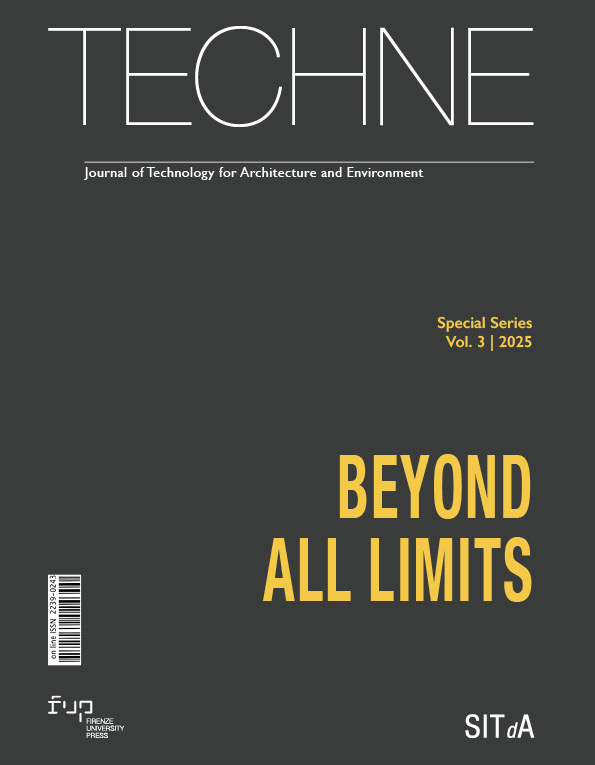Published 2025-07-31
Keywords
- Public buildings renovation,
- Living Lab,
- Digital Twin,
- Engagement,
- Co-design
How to Cite
Copyright (c) 2025 Gisella Calcagno, Lucia Montoni

This work is licensed under a Creative Commons Attribution 4.0 International License.
Abstract
In the face of climate change and energy crises, the renovation of existing buildings is an adaptation imperative. Despite ambitious policies, effective progress is hindered by a limited focus on financial returns, neglecting the broader social and environmental dimensions of renovations. This paper presents a university-driven Living Lab methodology experimenting with Digital Twins to foster collaboration and engagement in the co-design of ambitious renovation projects for public buildings. Tested in a pilot project site in a historical context, the research demonstrates the potential to optimise renovation processes and outcomes. Results highlight the transformative impact of the methodology, while addressing challenges for scaling up and replication.
Downloads
References
- Calcagno G., Trombadore A., Pierucci G., Olano C., Montoni L. (2023), “Untapping the potential of the digital towards the green imperative: the interdisciplinary beXLab experience”, Proceeding of “Technological Imagination in the Green and Digital Transition”, Rome 30 June, 1-2 July 2022, Springer. https://doi.org/10.1007/978-3-031-29515-7. DOI: https://doi.org/10.1007/978-3-031-29515-7_19
- Compagnucci, L., Spigarelli, F., Coelho, J. and Duarte, C. (2021), “Living Labs and user engagement for innovation and sustainability”, Journal of Cleaner Production, Vol. 289, pp. 125721. https://doi.org/10.1016/j.jclepro.2020.125721. DOI: https://doi.org/10.1016/j.jclepro.2020.125721
- Daniotti, B., Masera, G., Bolognesi, C.M., Lupica Spagnolo, S., Pavan, A., Iannaccone, G., Signorini, M., Ciuffreda, S., Mirarchi, C., Lucky, M. and Cucuzza, M. (2022), “The Development of a BIM-Based Interoperable Toolkit for Efficient Renovation in Buildings: From BIM to Digital Twin”, Buildings, Vol. 12(2), pp. 231. https://doi.org/10.3390/buildings12020231. DOI: https://doi.org/10.3390/buildings12020231
- Fingleton, J. and Jammet, M. (2021), Capturing the benefits of building renovation. Available at: https://worldgbc.org/wp-content/uploads/2022/03/BUILD-UPON-Framework-indicators-methodology_doublepage.pdf (Accessed on 15/11/2024).
- Hossain, M., Leminen, S. and Westerlund, M. (2019), “A systematic review of living lab literature. Journal of Cleaner Production”, Journal of Cleaner Production, Vol. 213, pp. 976-988. https://doi.org/10.1016/j.jclepro.2018.12.257. DOI: https://doi.org/10.1016/j.jclepro.2018.12.257
- Liao, H., Ren, R. and Li, L. (2023), “Existing Building Renovation: A Review of Barriers to Economic and Environmental Benefits”, International Journal of Environmental Research and Public Health, Vol. 20(5), pp. 4058. https://doi.org/10.3390/ijerph20054058. DOI: https://doi.org/10.3390/ijerph20054058
- Malmberg, K. and Vaittinen, I., Evans, P., Schuurman, D., Ståhlbröst, A. and Vervoort, K. (2017), Living Lab Methodology Handbook. https://doi.org/10.5281/zenodo.1146321.
- Marksel, M., Pavletič, N., and Letnik, T. (2024), “Enhancing Knowledge on Energy Refurbishment of Buildings and Green Procurement through Living Labs”, Buildings, Vol. 14(9), pp. 3009. https://doi.org/10.3390/buildings14093009. DOI: https://doi.org/10.3390/buildings14093009
- Selje, T., Schmid, L. A. and Heinz, B. (2024), “Community-Based Adaptation to Climate Change: Core Issues and Implications for Practical Implementations”, Climate, Vol. 12(10), pp. 155. https://doi.org/10.3390/cli12100155. DOI: https://doi.org/10.3390/cli12100155
- Trombadore, A., Calcagno, G., Montoni, L. and Pierucci, G. (2024), “Advancing the design process experience of heritage buildings’ renovation: a Toolkit for an ethical best path”, in Battisti, A. and Baiani S. (Ed.), ETHICS: Endorse Technologies for Heritage Innovation. Cross-disciplinary Strategies, Springer nature, Swiss, pp. 115-130. ISBN: 978-3-031-50121-0. DOI: https://doi.org/10.1007/978-3-031-50121-0_8
- van Geenhuizen, M. (2016), “Living Labs as boundary-spanners between Triple Helix actors in Journal of Contemporary Eastern Asia”, Journal of Contemporary Eastern Asia, Vol. 15(1), pp. 78-97. https://doi.org/10.17477/jcea.2016.15.1.078. DOI: https://doi.org/10.17477/jcea.2016.15.1.078
- Vervoort, K., Konstantinidis, E., Desole, M., Onur, O., Trousse, B., Woodcock, A., Garatea, J.. Ponomareva, A., Roset Pérez, B., Gamboa, G. and Bamidis, P. (2024), “A harmonized assessment method and KPIs for evaluating Living Labs”, Conference: XXXV Ispim Innovation Conference, Local innovation ecosystems for global impact, 9-12 June, 2024, Tallinn. https://doi.org/10.5281/zenodo.11581076.






